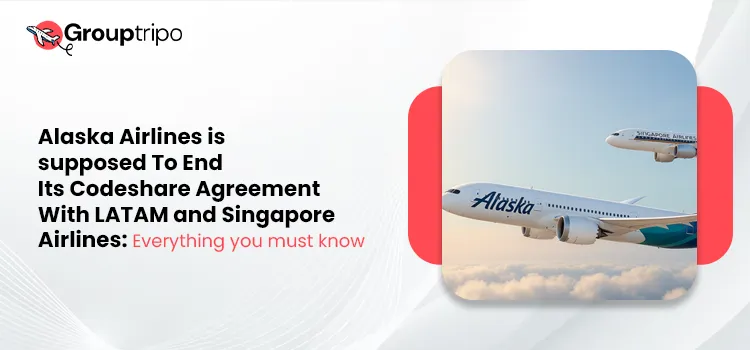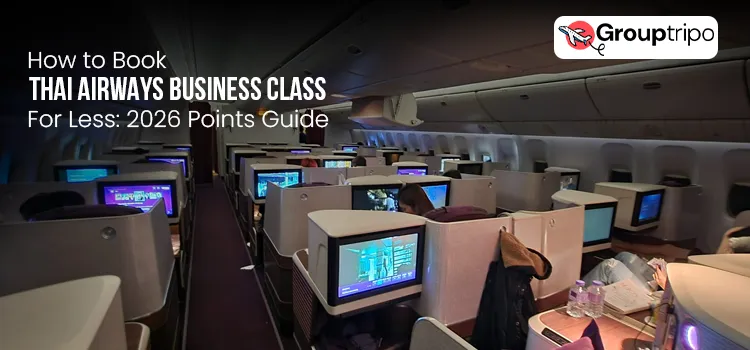
In a strategic move, Alaska Airlines has formally ended its Codeshare agreements with LATAM Airlines and Singapore Airlines as of October 1. This move will directly affect the travel advantages that are offered to passengers, like reciprocal loyalty rewards. However, the interline agreements that manage baggage transfers and ticketing between the airlines will also be affected. While the reason behind this decision is not disclosed, Alaska Airlines is aiming to strengthen its international network through expanded services and new partnerships.
The codeshare relationship with Latam and Singapore Airlines was made in 2019 and 2017 which has provided Alaska Airlines passengers with an extended reach across global destinations. This termination is considered the end of the shared flight arrangements and the linked loyalty programs which allowed members to earn and redeem miles across the networks of both Singapore and Latam Airlines.
Alaska Airlines is making New Partnerships
- Alaska Airlines ends codeshare partnerships with LATAM and Singapore Airlines to focus on new routes like Starlux Airlines.
- Being a part of an evolving strategy, Alaska Airlines is now focusing on new partnerships and improving the current ones.
- The airline has partnered with Starlux Airlines and Icelandair which are the two key players in the international routes.
- It allows passengers to connect to the major cities in the United States.
- Similarly, Starlux will open the routes to up to 20 cities through Seattle and San Francisco while Icelandair expands the reach of Alaska Airlines into the transatlantic market.
- It aligns with the efforts of Alaska to broaden its foreign networks and offer more worldwide options to the flyers.
- In addition to the ongoing partnership, Alaska Airlines is preparing for the launch of a direct flight from Seattle to Reykjavik which is planned for May 28, 2026.
- It shows a significant expansion of the airline’s European routes which reinforce the commitment of Alaska Airlines to offer matchless travel experience for the leisure and business travelers.
What Travelers Can Expect Due To The Removal Of Existing Codeshare?
Travelers who are enjoying the perks from the Alaska Airlines Codeshare agreements with LATAM Airlines and Singapore Airlines will no longer be able to earn loyalty points with these airlines. However, interline agreements remain intact and allow passengers to continue with their flight reservations and transfer luggage between these two airlines.
Travelers may experience some inconvenience in terms of loyalty rewards and the booking processes. While the Codeshare terminations do not impact the direct flight operations, travelers may face some difficulties with the booking procedure and loyalty benefits. Alaska Airlines has ensured that its Atmos rewards program which it has provided under the collaboration with Hawaiian Airlines, will be a key to focus moving forward and offer new loyalty options for the frequent flyers.
Alaska Airlines Aiming To Expand Its International Network
- The removal of the Codeshare agreement marks a key move in the global strategy of Alaska Airlines.
- It is making a notable shift to expand its reach in Asia and Europe while the airline may no longer partner with Singapore Airlines and Latam Airlines.
- On the other hand, the new partnership with Starlux and the direct flying services to Iceland demonstrate the intent of Alaska Airlines to target the growing market and provide its passengers with various options for the international routes.
- It also approaches the Alaska Airlines position as a key player in the transatlantic and Asia-Pacific markets, where both Taiwan and Iceland are seeing interest from international flyers.
| Existing
Connections via SEA and SFO |
Salt Lake City
(SLC) |
San Diego
(SAN) |
Phoenix (PHX) | Portland (PDX) |
|---|---|---|---|---|
| Las Vegas
(LAS) |
Dallas (DFW) | Denver (DEN) | Austin (AUS) | |
| New Connections
Offered via SEA and SFO |
Minneapolis St. Paul
(MSP) |
Atlanta (ATL) | Tampa (TPA) | Anchorage (ANC) |
| Raleigh-Durham
(RDU) |
Orlando (MCO) | Washington Dulles (IAD) | Kansas City
(MCI) |
|
| Philadelphia (PHL) | Spokane (GEG) | Boise (BOI) | Newark (EWR) |
A Wide Range Of Alliance And Codeshare Partners
- Alaska Airlines has officially ended its codeshare agreements with Singapore Airlines and LATAM.
- Alaska Airlines is still in its infancy for long-flight operations while expanding its fleet and network.
- STARLUX will link Alaska Airlines-operated flights to 12 cities through San Francisco International Airport and Seattle-Tacoma International Airport to Taipei’s Taoyuan International Airport under this new expanded codeshare arrangement.
- Alaska Airlines does offer worldwide connectivity to its passengers through its partnership with fellow OneWorld alliance members and interline partners.
- The airline has split its codeshare agreement into three categories based on the status advantages and the ability to earn points: Alliance Partners, Earn and Redeem Partners, and Earn Partners.
| OneWorld alliance members | All the other 14 oneworld members | ||
|---|---|---|---|
| Earn and Redeem partners | Aer Lingus | Air Tahiti Nui | Condor |
| Hainan Airlines | Icelandair | Korean Air | |
| Philippine Airlines | Porter Airlines | Starlux Airlines | |
| Earn only partners | Aleutian Airways | Bahamasair | Cape Air |
| Contour Airlines | Kenmore Air | Mokulele Airlines | |
| Southern Airways Express |
Final Words: What Is Next For Starlux?
Alaska Airlines officially terminated its codeshare partnerships with LATAM Airlines and Singapore Airlines as of October 1, 2025. STARLUX Airlines currently flies to 29 different destinations on 33 routes, including the United States, Japan, Macau, Vietnam, Thailand, the Philippines, Malaysia, and Singapore. It is focused on forming partnerships that will help provide a better travel experience and make it more competitive internationally in North America as the airline expands its services. Additionally, STARLUX is looking to create more agreements with other airlines to improve connections for both passengers and cargo, making it easier to travel and ship goods around the world. Contact Grouptripo at Call Us : +1-833-894-5333 for additional information regarding the termination of Alaska Airlines’s agreement and expansion with Starlux.
Frequently Asked Questions
Alaska Airlines completed its purchase of Hawaiian Airlines in September 2024 and is now in the process of merging the two airlines. While they will still operate separately for a while, the goal is to bring them together as one airline over time. This integration includes making sure both airlines follow the same rules, updating their booking systems and using similar names for fares. Major changes are expected to take place in late 2025 and into 2026.
Alaska Airlines is ending the services of certain routes, including the five primarily seasonal and Mexico-focused routes, around October 2025: Fresno to Guadalajara, Boise to Orlando, Los Angeles to Monterrey, Sacramento to Orlando, and Kansas City to Puerto Vallarta. These changes are a continuation of earlier route elimination in April 2025 that included the four transcontinental flights like Los Angeles to Washington D.C and San Francisco to Chicago.
Yes! Alaska Airlines and American Airlines have a strong partnership with the OneWorld Alliance membership. It allows passengers to earn and redeem miles on both carriers and enjoy the alliance status benefits. This partnership enables passengers to reserve flights using miles and Loyalty Points to access partner benefits like priority services with other carriers.
Alaska Airlines codeshares with other airlines like Starlux Airlines and Icelandair, which allows travellers to book their flights with the partner airline through the Alaska Airlines official website. It expands travel options and offers benefits like coordinated check-in and baggage handling. Passengers can earn and redeem miles on these partner airline which add flexibility to their trip.
Alaska Airlines recent widespread cancellations were caused by an IT outage on July 20, 2025 due to a critical hardware failure at their data centers. It necessitated a temporary and fleet-wide group stop which led to many flight disruptions.















